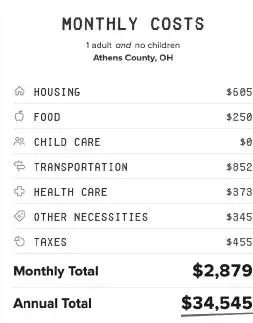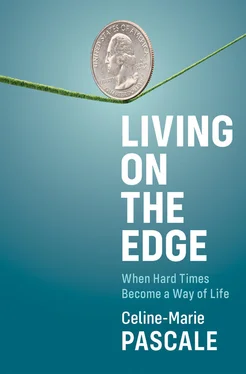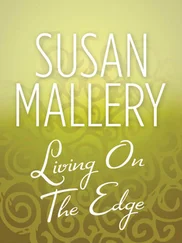Recall from Chapter 1that the EPI uses the Fair Market Rent (FMR) calculation established by HUD. FMR was established to standardize payments for low-income housing. In any given housing market, about 60% of local housing will be more expensive than FMR. There is a wide variety of housing in Athens County. Yet typical rent for a decent one-bedroom apartment runs between $800 and $1,300 a month – a long way from FMR. In this regard, the EPI self-sufficiency budget, which allocates only $605, is clearly low for the area. However, even using the FMR calculation, the EPI budget is more than twice what Michael currently earns.
I am confident that Michael would be shocked by this self-sufficiency budget. If he accepted the EPI figures as representing a basic standard of living, he would see his income, and his efforts to get by every month, in a very different perspective. Like many others, Michael has normalized his inability to pay all of his bills all of the time, his inability to live alone, to take time off when he is sick or to afford health care. Not only is all of this ordinary to him, Michael is doing better than many around him. Basic self-sufficiency, as a standard of living, is not something he imagines as part of his life – and this suits his employers just fine. What has become ordinary for Michael is both completely unacceptable and unlikely to change.

Certainly, wealth and poverty are relative terms – there will always be someone earning less and someone earning more. Yet hunger and a lack of running water should not be the measure of poverty in any country – and certainly not in one that is among the wealthiest in the world. Michael did not end up in badly paid jobs because he lacks skills or intelligence. Nor because he chose a random “follow your heart” kind of dream. He applied for the entry-level positions that were available to him. If entry-level jobs once gave workers a leg up the proverbial ladder, the reality today is quite different. In the twenty-first century, low wage, entry-level employment often is what holds people in poverty. Part-time service industry work keeps people, and the families they support, in a very stressful and nearly constant economic scramble. Michael tells me he hopes to convert one of his jobs to full-time status soon, but even so he will still need to continue to work part-time at the other. The full-time salary won’t pay his bills, let alone enable him to attain economic self-sufficiency.
The situation is similar for Rose Taylor, a white woman, who has lived most of her nearly thirty years in Athens County. She describes herself as among the more economically privileged in the county and it is clear that her friends think of her as fairly successful. “I have had friends borrow money from me, because they need to pay their rent, or they need food. The majority of my friends, I would say, barely make it every month.” Despite Rose’s desire to help, she finds the situation a little stressful because she too can find herself financially strapped at times.
Rose holds an associate degree and works thirty-six hours a week as a certified nursing assistant (CNA) caring for an elderly woman with Alzheimer’s Disease. Her shift as a CNA is from 9 p.m. to 9 a.m. three days per week. If you know anything about Alzheimer’s Disease, you know that there are no “easy” shifts in care giving. Dementia care at any time of day is full of unexpected challenges as well as surprising rewards. Like Michael, Rose especially values working the night shift because it doesn’t interfere with the fluctuating schedule at her second, day job where she spends thirty hours a week doing body piercing. Typically, three days a week she is scheduled at both jobs, which leaves her just enough time between jobs to shower and go for a walk with her “fur child,” a sweet dog that she cares for with her sister.
Rose describes her life as unsustainable but tells me that for now she has to make it work. Between the two jobs, she works sixty-six hours a week and earns less than $23,000 – before taxes. Rose has no benefits at either job. Her income is almost double the federal poverty line. That puts her well ahead of the 12.9% of all women in the country who lived at or below the federal poverty line in 2017. Perhaps most striking is that after state and federal taxes, Social Security tax and Medicare tax, Rose’s income is less than $17,083 – and this is without any form of health care. Like Michael, she is above the poverty line of $12,140 but below the area standard for self-sufficiency income of $34,545.
With an after-tax income around $17,000, it’s easy to see why Rose cannot afford to live alone – even though she works over sixty hours a week. If she became lucky enough to find a decent one-bedroom apartment for $800 a month, Rose would need to spend $9,600 per year on rent. Flats on the higher end ($1,300 a month) would cost her $15,600 a year. In order to get by, Rose shares an apartment with her sister, who juggles three part-time jobs – two as a nurse and one helping her mother at a diner. Rose and her sister tend to work opposite days/shifts which enables them to share custody of their “fur child.” The dog provides great companionship for quiet walks in the woods, which have become an essential source of emotional support. “Life is incredibly stressful,” explains Rose, “and the stress never goes away.” Even without a crisis, life is a constant struggle for enough money, enough sleep, enough ease.
Rose has been trying to put money away each month. She tells me that if she can build a financial cushion, she’ll be able to catch a break. What would catching a break look like? She tells me it would be staying home from work when she is sick or having time to do something she likes. Yet the ability to put a little money away each month depends on nothing going wrong – and something always seems to be going wrong. Last month, her savings were completely wiped out because she needed tires for her car. “It often feels like I’m doing really well. I have like a little tiny bit of savings. But then something happens, then it’s like, oh, now I have to start all over again.” As she talks, it’s easy to see the deep exhaustion in her face. Rose’s life is itself a contradiction: on the one hand she calls herself “lucky” because she could afford the tires and thus keep working, yet on the other hand, in her daily life, she doesn’t feel very lucky. This is life in the struggling class.
“I recently went to the dentist. I have to have dental surgery next week, and I don’t have dental insurance. And so, it’s going to cost me like $600 to fix my tooth, and that’s something that like I wasn’t planning on obviously. Stuff like that stresses me out and it makes me like want to work more. But, at the same time, I need to protect my mental health as well. I manage anxiety a lot. I manage depression as well.” Low-wage work exacts a high human cost.
Like many other folks working very long hours at multiple part-time jobs, Rose has no health insurance, sick time, or retirement benefits. “I had Obamacare last year. I tried to sign up again but ended up taking hours on the phone. I just didn’t have time to like figure it out. Then the deadline passed. It was tricky because of my two jobs and two different incomes, and there was like a lot of questions.” She’ll try again next year but for now she’s planning on taking out a medical loan to pay the dental bill. Rose reflects for a moment and says: “It’s not even like a thing to ask about health insurance [when looking for work]. I know people that only have one job, they manage a bar or manage a restaurant, and they sometimes don’t even have health insurance, I want to say like 50% of the time.” Businesses with fewer than fifty employees have no legal obligation to provide health insurance. It’s no wonder that medical loans are a thriving industry. We’ll look at those carefully in the next chapter.
Читать дальше













